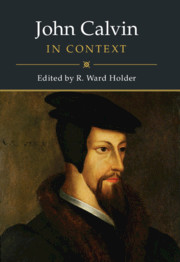Book contents
- John Calvin in Context
- John Calvin in Context
- Copyright page
- Dedication
- Contents
- Contributors
- Acknowledgments
- Abbreviations
- Introduction
- Part I France and Its Influence
- Part II Switzerland, Southern Germany, and Geneva
- Part III Empire and Society
- Part IV The Religious Question
- Part V Calvin’s Influences
- 34 Calvin and Luther
- 35 Calvin and Melanchthon
- 36 Calvin and the Swiss and South German Evangelicals
- 37 Calvin’s Friends
- 38 Calvin’s Critics
- 39 Calvin’s Lutheran Critics
- 40 Calvin’s Catholic Critics
- 41 Calvin and the Anabaptists
- Part VI Calvin’s Reception
- Conclusion
- Bibliography
- Index
- References
38 - Calvin’s Critics
Bolsec and Castellio
from Part V - Calvin’s Influences
Published online by Cambridge University Press: 14 November 2019
- John Calvin in Context
- John Calvin in Context
- Copyright page
- Dedication
- Contents
- Contributors
- Acknowledgments
- Abbreviations
- Introduction
- Part I France and Its Influence
- Part II Switzerland, Southern Germany, and Geneva
- Part III Empire and Society
- Part IV The Religious Question
- Part V Calvin’s Influences
- 34 Calvin and Luther
- 35 Calvin and Melanchthon
- 36 Calvin and the Swiss and South German Evangelicals
- 37 Calvin’s Friends
- 38 Calvin’s Critics
- 39 Calvin’s Lutheran Critics
- 40 Calvin’s Catholic Critics
- 41 Calvin and the Anabaptists
- Part VI Calvin’s Reception
- Conclusion
- Bibliography
- Index
- References
Summary
Few figures from the Reformation era have remained as divisive as John Calvin. Whether because of Calvin’s doctrine of predestination or his involvement in the execution of Michael Servetus in Geneva in 1553, his contemporary detractors found ample reason for dissension. Regarding the former, five-odd centuries have done little to ameliorate (and perhaps much to exacerbate) the prima facie severity of Calvin’s specific brand of predestination, which maintains that God foreordained multitudes to eternal damnation before the creation of the world. Anyone who has been tasked with explaining the reformer’s thoughts on this matter to undergraduates in a Christianity 101 course (or to an innocent bystander at the local watering hole) is keenly aware of its almost universal unattractiveness. This sentiment holds a fortiori for the execution of Servetus. Two key sixteenth-century figures, Jérôme-Hermès Bolsec and Sebastian Castellio, honed in on these two issues in a barrage of anti-Calvinist writings. In doing so, they painted the first broad strokes of what would prove to be an enduring image of Calvin as a dour and intransigent figure. Moreover, they forced Calvin and Geneva into a series of defensive responses that were formative in the process of confessionalization beginning in the 1550s, a crucial period for religious identity formation especially among Swiss Protestant churches.
- Type
- Chapter
- Information
- John Calvin in Context , pp. 336 - 344Publisher: Cambridge University PressPrint publication year: 2019

